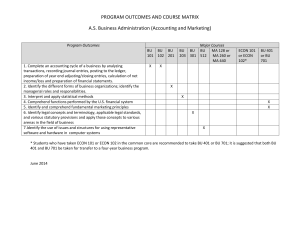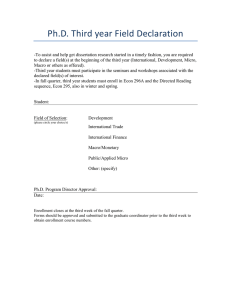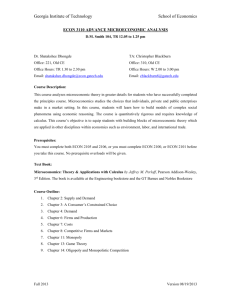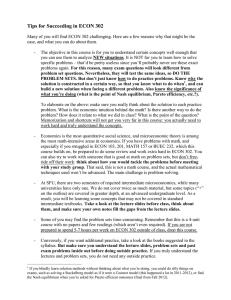Effective January 2013 REQUIREMENTS FOR THE PhD DEGREE
advertisement
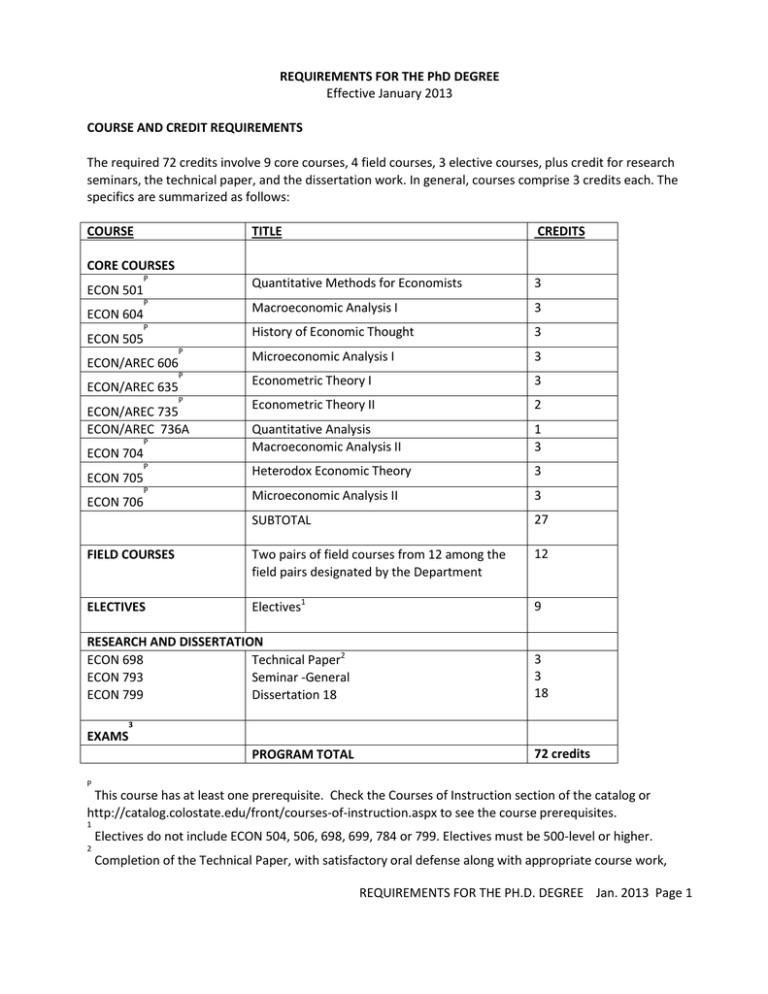
REQUIREMENTS FOR THE PhD DEGREE Effective January 2013 COURSE AND CREDIT REQUIREMENTS The required 72 credits involve 9 core courses, 4 field courses, 3 elective courses, plus credit for research seminars, the technical paper, and the dissertation work. In general, courses comprise 3 credits each. The specifics are summarized as follows: COURSE TITLE CREDITS P Quantitative Methods for Economists 3 P Macroeconomic Analysis I 3 CORE COURSES ECON 501 ECON 604 P History of Economic Thought 3 P Microeconomic Analysis I 3 P Econometric Theory I 3 P Econometric Theory II 2 Quantitative Analysis Macroeconomic Analysis II 1 3 P Heterodox Economic Theory 3 P Microeconomic Analysis II 3 SUBTOTAL 27 FIELD COURSES Two pairs of field courses from 12 among the field pairs designated by the Department 12 ELECTIVES Electives1 9 ECON 505 ECON/AREC 606 ECON/AREC 635 ECON/AREC 735 ECON/AREC 736A P ECON 704 ECON 705 ECON 706 RESEARCH AND DISSERTATION ECON 698 Technical Paper2 ECON 793 Seminar -General ECON 799 Dissertation 18 3 3 18 3 EXAMS PROGRAM TOTAL 72 credits P This course has at least one prerequisite. Check the Courses of Instruction section of the catalog or http://catalog.colostate.edu/front/courses-of-instruction.aspx to see the course prerequisites. 1 Electives do not include ECON 504, 506, 698, 699, 784 or 799. Electives must be 500-level or higher. 2 Completion of the Technical Paper, with satisfactory oral defense along with appropriate course work, REQUIREMENTS FOR THE PH.D. DEGREE Jan. 2013 Page 1 satisfies the requirements for the Plan B MA degree. Therefore, the MA degree can be awarded along the way to the PhD. 3 Students must pass the written PhD Qualifying Examination, the preliminary Oral Examination, and the final Oral Examination. FIELDS Students choose two of the following pairs of courses, and must complete each course in each pair with a grade of at least B, to satisfy the Fields requirement: Development Economics ECON 760 ECON 792E Microeconomic Development Macroeconomic Development Environmental Economics ECON/AREC 740 ECON/AREC 741 Economics of Natural Resources Environmental Economics International Economics ECON 640 ECON 742 International Trade Theory and Policy International Finance Political Economy ECON 772 ECON 770 Marxian Economics Political Economy of Race and Gender Public Economics ECON 520 ECON 720 Economics of Taxation Economics of Public Expenditure Regional Economics ECON/AREC 563 ECON 663 Regional Economics Theory and Methods Urban and Regional Modeling Please note that faculty availability and student demand affect the feasibility of offering particular field courses in particular years, and students should remain informed of which field options are available to fit the timing of their program plans. The department’s tentative schedule of field course offerings in coming years, subject to change, is available on the website under Courses. GPA REQUIREMENTS Students must maintain a 3.0 minimum GPA across 500+ level ECON courses; must maintain a 3.0 minimum GPA for university course work in general; and must earn a grade of at least B in each course counting toward a declared field. REQUIREMENTS FOR THE PH.D. DEGREE Jan. 2013 Page 2 EXAMINATIONS Ph.D. Qualifying Examination in Macroeconomics and Microeconomics To qualify to continue in the program, Ph.D. students must pass the written Qualifying Examination. The Qualifying Exam includes two halves, macroeconomic theory and microeconomic theory, and requires the student to demonstrate achievement of an acceptable level of professional competence in these fundamental areas of modern economics. To attempt the Qualifying Exam, an individual must be a registered economics graduate student who is in compliance with the program’s GPA standards for Satisfactory Performance, and who has completed the Macro and Micro theory course sequences. To meet Satisfactory Progress standards, students must attempt the Qualifying Exam in January of the second year (after completion of Econ 704 and 706). For additional information, see the website under PhD Qualifying Examination. Preliminary Oral Comprehensive Examination After passing the Qualifying Examination, and at least two semesters before the final oral examination (dissertation defense), the student must pass an oral comprehensive exam administered by his/her advisory committee. The content of this exam will be determined by the committee in each case but will ordinarily include presentation of a prospectus on the student’s proposed dissertation research. In addition, material covering economic theory or the student’s fields may be included where the committee determines that such coverage is warranted. Final Oral Examination (Dissertation Defense) The final examination is an oral dissertation defense in which the student is examined on the contents and methods of his/her dissertation research as well as related areas of economics. RESEARCH The Technical Paper During the summer after the first year, students write papers that apply empirical methods to the theory learned in ECON 604, 606, and 705, for a grade to be assigned upon enrollment in ECON 698 the subsequent fall. These three short papers together can constitute a “Technical Paper” that would be defended in the fall to satisfy that requirement for the MA (Plan B), both for students who continue to the PhD, and those who ultimately do not pass the Qualifying Examination or who otherwise do not complete the PhD program. Seminar Students enroll in one semester of Research Seminar, ECON 793, in the sixth semester. Third-year students begin researching and writing their dissertation proposals. The Dissertation REQUIREMENTS FOR THE PH.D. DEGREE Jan. 2013 Page 3 Each candidate for the PhD degree must submit an acceptable dissertation, embodying publishable original research on a topic approved in advance by the student’s committee. A PhD dissertation is the scholar’s own contribution to knowledge and reflects the ability to conduct and communicate independent research of such caliber and expertise that it adds significantly to the field of knowledge. The dissertation format must comply with the standards specified in the Graduate School’s Thesis Manual (available at the CSU Bookstore) and be approved by the Department prior to binding. A hardbound copy of the dissertation must be submitted to the Department Chair. It is also customary that a hard-bound copy of the dissertation be presented to the student’s dissertation director. TIME LIMITS The Graduate School requires that courses applied toward fulfilling the requirements for a doctoral degree must have been completed within the ten years immediately preceding the date of completion of requirements for the doctoral degree. This requirement does not apply to courses transferred from the Master’s degree. In addition to this general requirement, the Department has its own stricter standards for timely progress; see the website under Satisfactory Progress. TYPICAL PROGRAM SCHEDULE The following sample 5-year schedule assumes no transfer credit, and aims to prepare the student to be on the academic job market in the fall of the fifth year. Schedules for students in the second and third years will depend on the scheduling of the field courses in which they are interested. FIRST YEAR SECOND YEAR THIRD YEAR FOURTH YEAR FIFTH YEAR Fall ECON 501, ECON 505, ECON 635 Spring ECON 604, ECON 606, ECON 705, ECON 735, ECON 736A Summer Research: Technical Paper (see description above for ECON 698) Fall ECON 698, ECON 704, ECON 706 (and possible field course) Spring Qualifying Examination and 2 Field Courses and 1 elective course Fall 2 Field Courses and 1 Elective Course Spring ECON 793 - work toward dissertation proposal – 1 elective course Fall Preliminary Oral Examination; dissertation work Spring Dissertation work Fall Job market; dissertation work Spring Dissertation work; final oral examination; submission of the final dissertation REQUIREMENTS FOR THE PH.D. DEGREE Jan. 2013 Page 4
